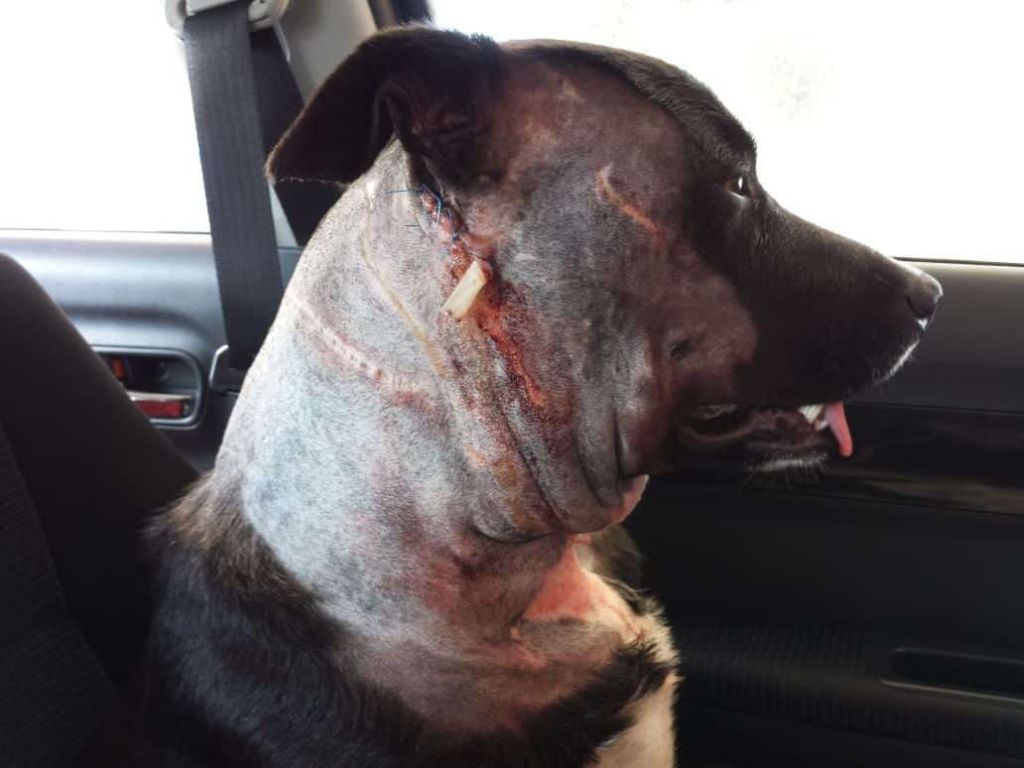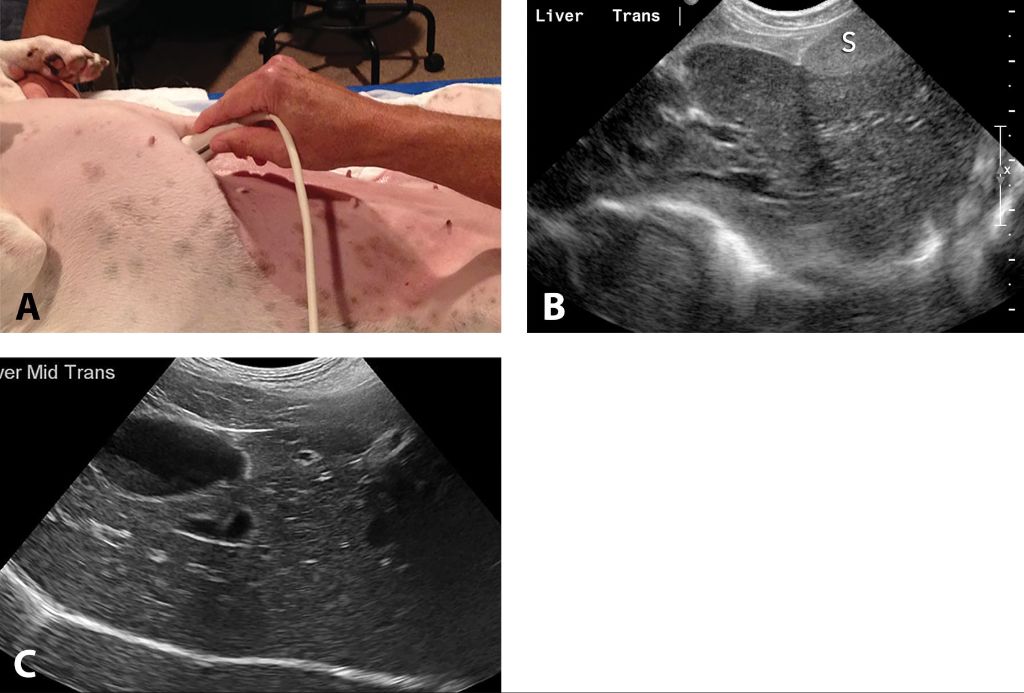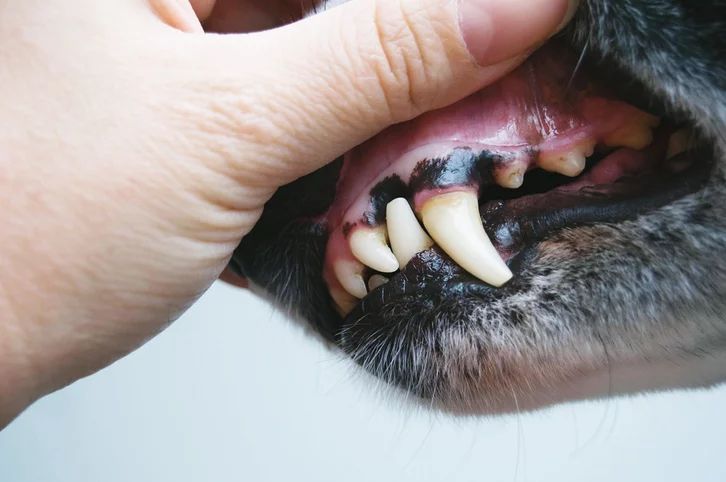Introduction
Seeing your dog vomit blood can be an extremely scary and stressful experience for any pet owner. While there are many potential causes, severe stress is one factor that can lead to gastrointestinal bleeding in some cases.
For example, Rusty, a 2-year-old Labrador Retriever, recently experienced a highly stressful incident when he was attacked by a neighbor’s aggressive dog. Though Rusty’s physical injuries were minor, the emotional trauma led to a noticeable change in his behavior over the following days. He became withdrawn, refused to eat, and began having episodes of vomiting up alarming amounts of bright red blood.

Rusty’s owner rushed him to the emergency vet, terrified that something was seriously wrong. The vet determined that while the stress of the attack did not directly damage his stomach or intestines, it likely triggered ulcer formation that caused the bleeding. With medication and stress reduction at home, Rusty made a full recovery within a few weeks.
Rusty’s case reveals how severe stress can take a major toll on a dog’s gastrointestinal health. While rare, stress-linked stomach ulcers and bleeding do occur in some circumstances. In this article, we’ll explore the causes, diagnosis, and treatment for stress-induced vomiting of blood in dogs.
What Causes Dogs to Vomit Blood?
There are several potential causes for a dog vomiting blood. Some of the most common include:
- Ulcers in the stomach or intestines – These can form due to stress, ingestion of toxins, or excessive use of NSAIDs. The ulcers erode the stomach/intestinal lining and cause bleeding.
- Ingestion of toxins or foreign objects – Dogs may eat something sharp, caustic, or poisonous, which can wound the GI tract and lead to vomiting of blood. Toxins like antifreeze, lead, zinc, and insecticides are common culprits.
- Parasites – Intestinal parasites like hookworms and whipworms attach to the intestinal wall and suck blood. This can irritate the intestines and cause bloody vomit.
- Trauma – Blunt trauma to the abdomen can damage organs and vessels, resulting in internal bleeding and bloody vomit.
- Blood clotting disorders – Dogs with clotting factor deficiencies can experience spontaneous internal bleeding that makes its way up the esophagus.
- Cancer – Tumors in the stomach, intestines, liver, or spleen may erode blood vessels and lead to vomiting of blood.

While scary for pet owners, bloody vomit does not necessarily indicate a life-threatening problem. However, prompt veterinary care is essential for identifying and treating the underlying cause.
Sources:
https://www.hillspet.com/dog-care/healthcare/dog-vomiting-blood
https://bondvet.com/b/why-is-my-dog-throwing-up-blood
How Stress Affects a Dog’s Body
When a dog experiences stress, it triggers a physiological response in the body. The hypothalamic-pituitary-adrenal (HPA) axis is activated, which causes a release of stress hormones like cortisol and adrenaline [1]. These hormones increase blood pressure, heart rate, and blood sugar levels to prepare the dog’s body to deal with the stressor.
Cortisol, in particular, takes a major toll on a dog’s body when chronically elevated due to ongoing stress. Studies show that long-term high cortisol levels suppress the immune system, increase the risk of infections, and can damage the hippocampus region of the brain [2]. High cortisol also causes protein breakdown in muscles and bones over time.
The physical effects of frequent stress response activation place great strain on a dog’s cardiovascular system. Their heart has to work harder, and arteries constrict to increase blood pressure. Over time, this may lead to hypertension and other cardiovascular diseases if the stress is not addressed.
Stress-Induced Ulcers in Dogs
One of the most common causes of dogs vomiting blood due to stress is the development of stomach ulcers. Ulcers are sores that can form in the stomach lining when there is an imbalance between digestive acids and protective factors. When dogs experience stressful events or situations such as separation anxiety, changes in environment, or trauma, their bodies initiate a “fight or flight” response. This leads to increased levels of cortisol and other hormones that can disrupt the protective factors in the stomach lining, allowing digestive acids to damage the tissue and create ulcers.
Research indicates that the incidence of stress-induced ulcers in dogs has not been precisely determined, but they are known to occur in some animals following surgery or other traumatic experiences [1]. These ulcers can erode deep enough to cause bleeding into the stomach. As the blood accumulates and mixes with stomach contents, it turns the vomit red or coffee ground-like in appearance when the dog regurgitates it. Stress ulcers tend to be most common in high-strung dog breeds prone to anxiety.
Treating stress-related ulcers requires addressing the underlying cause of stress, providing gut-protective medications, and in severe cases, hospitalization for intravenous fluids, anti-nausea drugs, and other supportive care. Preventing stress ulcers involves minimizing stressful situations when possible and using anti-anxiety training and medications as needed for dogs prone to stress.
Other Stress-Related Causes
In addition to ulcers, stress can lead to other gastrointestinal issues that may result in a dog vomiting blood:
Gastritis: Inflammation of the stomach lining, often caused by stress, can lead to erosion and bleeding. Gastritis in dogs can result in vomiting blood or passing dark, tarry stools.[1]
Esophageal Tears: Forceful vomiting can cause tears in the esophagus, which may bleed. This tends to happen more frequently in older dogs.[2]
While ulcers are the most common cause of stress-induced vomiting of blood in dogs, other potential sources of bleeding like gastritis and esophageal tears should be considered as well.
[1] https://www.petcarerx.com/article/why-is-my-dog-vomiting-blood/1325
[2] https://wagwalking.com/condition/vomiting-of-blood
Diagnosing the Cause
There are several diagnostic tests veterinarians use to try to identify the cause and source of a dog vomiting blood.
One of the first things the vet will do is take the dog’s medical history and ask questions to understand the context around the vomiting. They will want to know details like how long the vomiting has been happening, how frequent it is, if there are any other symptoms, and if anything in the dog’s routine or environment changed recently.
A complete blood count (CBC) is a common early diagnostic test to look for indicators of infection, clotting issues, cancers and other conditions. Blood chemistry tests can check liver and kidney function for signs of disease.

Imaging tests are also very helpful for locating the source of bleeding. An abdominal ultrasound allows the vet to visualize the gastrointestinal tract and abdominal organs. X-rays can also reveal foreign objects, tumors, ulcers or obstructions.
Endoscopies are a procedure to examine the upper GI tract using a camera on a flexible tube. Biopsies can be taken during endoscopies to test tissue samples. This helps identify gastritis, ulcers and cancerous growths as potential causes.
Coagulation tests check a dog’s blood clotting ability. Prolonged clotting time can lead to excessive blood loss.
Looking at the color and contents of the vomit can provide clues too. Dark red suggests upper GI or respiratory bleeding. Coffee ground appearance indicates blood has partially digested. Presence of food particles points to vomiting shortly after eating.
Treatment Options
The treatment plan for a dog vomiting blood will depend on the underlying cause. If an ulcer is responsible, the veterinarian may prescribe antacids, acid reducers like famotidine (Pepcid) or sucralfate to allow the ulcer to heal. Dietary changes may also be recommended, like feeding smaller, more frequent meals of a bland diet. The dog may need to avoid foods that irritate the GI tract, like fatty or spicy foods. If an infection is causing the vomiting, antibiotics will likely be prescribed. Parasites will be treated with dewormers or other anti-parasitic medication. For vomiting caused by ingesting toxins or foreign objects, treatment is focused on removing the substance and providing supportive care to manage symptoms. This may involve inducing vomiting or using anesthesia for endoscopy to retrieve the object.
In all cases, the dog will need fluids and electrolytes to counteract dehydration and shock from blood loss. This is often done by intravenous (IV) fluids administration. Anti-nausea medication like ondansetron can help stop vomiting. If bleeding is severe, a blood transfusion may be necessary. The veterinarian may hospitalize the dog for close monitoring and to administer medications and IV fluids. With appropriate treatment matched to the underlying problem, most dogs recover fully from vomiting blood, especially when addressed quickly before severe complications arise.
Preventing Stress-Induced Vomiting
There are several ways dog owners can help minimize stress and reduce the chances of vomiting:
- Stick to a routine – Dogs thrive on routine and consistency. Feed them, walk them, and play with them at around the same times each day.
- Provide enrichment – Rotate new toys to keep dogs mentally stimulated. Food puzzle toys can make mealtime more engaging.
- Ensure enough exercise – Aim for at least 30-60 minutes of exercise per day depending on breed. Walks and play time help relieve pent-up energy.
- Create a safe space – Dogs should have access to a quiet, comfortable area for napping and relaxing.
- Use calming aids – Pheromone diffusers, calming treats, or ThunderShirts can help ease anxiety.
- Crate train – Properly crate trained dogs see their crate as a safe den, which can reduce stress.
- Avoid triggers – If certain stimuli like loud noises or strangers tend to stress a dog, limit their exposure when possible.
While some stress may be unavoidable, following these tips can significantly lower a dog’s baseline anxiety levels. A calmer dog is less likely to exhibit vomiting and other stress-related symptoms. However, if vomiting persists, a vet visit is warranted to diagnose and treat the underlying issue.
When to Seek Emergency Care
While some causes of vomiting blood may not require immediate veterinary intervention, seeing any amount of blood in your dog’s vomit warrants a call to your vet. It’s important not to delay seeking treatment, as significant blood loss can lead to dangerous complications like anemia, shock, and even death in severe cases.
You should seek emergency veterinary care right away if your dog is vomiting large amounts of bright red blood, or if the vomit resembles coffee grounds, which indicates digested blood. These signs point to active internal bleeding, which can quickly become life-threatening without swift treatment. Mucus that is thick and bloody also signifies the need for emergency care.

Likewise, if your dog seems lethargic, collapses, has very pale gums, or shows other signs of weakness or instability after vomiting blood, get emergency help immediately. These can indicate significant blood loss or a rapidly worsening condition that requires urgent veterinary assessment and care.
While vomiting small specks or streaks of blood may not require emergency treatment, you should still call your vet without delay. They can help determine the cause and whether your dog needs to be seen right away based on the specifics of your dog’s condition.
Don’t try home remedies or wait to see if symptoms improve when you notice bloody vomit. It’s always safest to have your vet examine your dog promptly whenever blood is present in their vomit. Quick assessment and treatment can help prevent more serious complications and potentially save your dog’s life.
Summary
As we’ve discussed, stress can potentially cause dogs to vomit blood in certain situations. The most common cause is stress-induced ulcers in the stomach and upper intestines. Prolonged stress leads to elevated cortisol levels, which can increase stomach acid production and damage the stomach and intestinal lining. This allows ulcers to form which can then bleed into the digestive tract and cause bloody vomit.
Other potential stress-related causes include vomiting up blood swallowed from chewing on injured paws or stress colitis, where inflammation in the colon leads to bloody diarrhea that a dog may then vomit up. While stressful events don’t always lead to bleeding in dogs’ stomachs or intestines, dogs prone to stress and anxiety are at higher risk.
If your dog vomits blood after a stressful incident, take them to the vet immediately. Tests like bloodwork, abdominal ultrasound or endoscopy can help diagnose the underlying cause. Treatment depends on the diagnosis but usually involves medication, dietary changes, probiotics and reducing stress. While alarming, bloody vomit due to stress is treatable if properly diagnosed and managed. Stay vigilant for signs of vomiting blood in high strung dogs, and take action quickly to protect their health.
In summary, while not guaranteed, prolonged stress can potentially cause dogs to vomit blood in certain cases, usually due to stress-induced ulcers or inflammation. Quick diagnosis and treatment is key to protecting your dog’s health.
